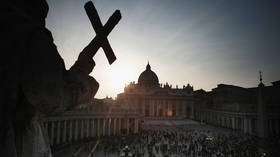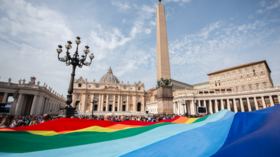
The UK’s Confraternity of Catholic Clergy felt compelled to respond to this week’s announcement on blessings and gay relationships

File photo of St. Peter’s Square at the Vatican, on April 2, 2005 © Getty Images / Christopher Furlong/Getty Images
An organization of British priests has released an open letter in which it said that the teachings of the Catholic Church were “unchangeable,” in response to a landmark ruling approved by Pope Francis declaring priests can now issue blessings to same-sex couples, under certain conditions.
On Monday, a document issued by the Vatican’s doctrinal office said Roman Catholic priests could choose to deliver blessings to same-sex couples on a “case-by-case basis.” However, it stressed that the process is not intended to supersede the sacrament of heterosexual marriage. Nor could it happen during a regular church ritual or liturgy.
In the Roman Catholic Church, a blessing is when a priest or minister asks God to protect or grant favor to a person or people. The Vatican’s declaration, it said, would reflect that God welcomes all types of people, but that such blessings would not legitimize “irregular” situations or relationships.
In a letter released on Thursday and signed by some 500 priests from the UK’s Confraternity of Catholic Clergy, the group felt compelled to reiterate the traditional values of the Church – which it confirmed remain “unchanged and unchangeable.”

Read more
The letter added that it wanted to address the “widespread confusion” which has followed the Vatican’s decree.
“We see no situation in which such a blessing of a couple could be properly and adequately distinguished from some level of approval,” they wrote, adding that “such pastoral blessings are pastorally and practically inadmissible.”
Roman Catholic dogma teaches that being attracted to a person of the same sex is not a sin, but participating in homosexual acts are. Since becoming Pope in 2013, Pope Francis has taken steps to make the Church more welcoming to LGBTQ people without contradicting the faith’s moral doctrine.
Ulrich L. Lehner, a theology professor at the University of Notre Dame, was also among the critics of the Vatican’s guidance, saying that the message approved by the Pope “invites misunderstanding and will sow confusion.”
Lehner added that it could also lead to a divergence in the Church’s teachings. “It is, and I hate to say it, an invitation to schism,” he said.
However, the Vatican’s document states that the advice will ensure that more people “increase their trust in God,” which it said “must be nurtured, not hindered.”




